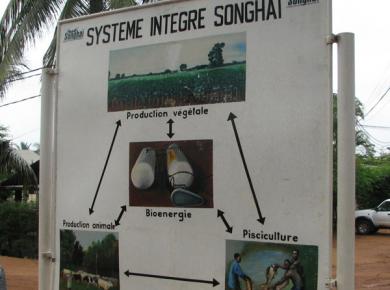Posted: August 25, 2014
Democratic Republic of Congo and Burkina Faso – Five Mennonite World Conference member churches recently collaborated on a project intended to build self-sustainable church programs within African Mennonite communities.
Communauté Evangélique Mennonite (Evangelical Mennonite Church) of DR Congo and Église Évangélique Mennonite du Burkina Faso (Evangelical Mennonite Church of Burkina Faso) partnered with Mennonite Church Canada, the Evangelical Mennonite Conference (Canada), and Association des Églises Évangéliques Mennonite de France (French Mennonite Church) to send two African Mennonite young people for training in entrepreneurship and small-scale agriculture.
Other project partners included Africa Inter-Mennonite Mission and Mennonite Mission Network.
Jean Mbuabua from the Democratic Republic of Congo and Arouna Sourabie from Burkina Faso were selected by their respective national Mennonite churches as the recipients for this program. Together, they will receive necessary training at the Songhaï Center in Porto Novo, the capital city of Benin.
The Songhaï Centre is a zero emissions–model research farm that also educates students in ecologically sustainable farming practices in the context of an African environment. The centre is gaining worldwide recognition for its advances in ecologically sustainable agriculture in the African context. Songhaï specializes in training young agricultural entrepreneurs and equips them to embrace new sustainable economic opportunities using natural resources that are found in their own communities in Africa.
At the end of their training, Mbuabua and Sourabie will return to their home countries to launch small-scale farming activities. Their new skills will help them earn an income for themselves and for their church programs. They will also train others who can then carry on this work elsewhere.
“This program has enormous potential for everyone involved,” says Hippolyto Tshimanga, Mennonite Church Canada Director for Africa Ministry. “The best way [to build the global church] is to equip people to meet their basic needs and the needs of their local congregations.” This program, he hopes, will do just that.
Adapted from a Mennonite Church Canada news release by Deborah Froese

Comments: